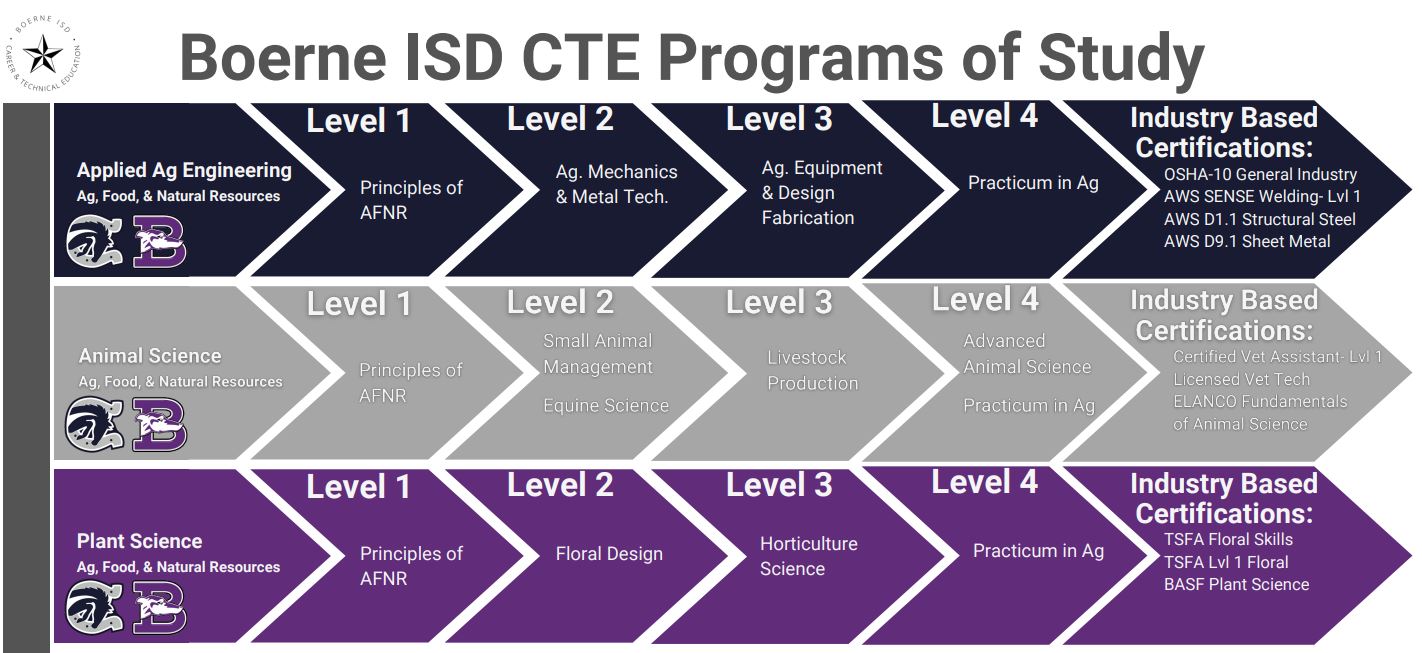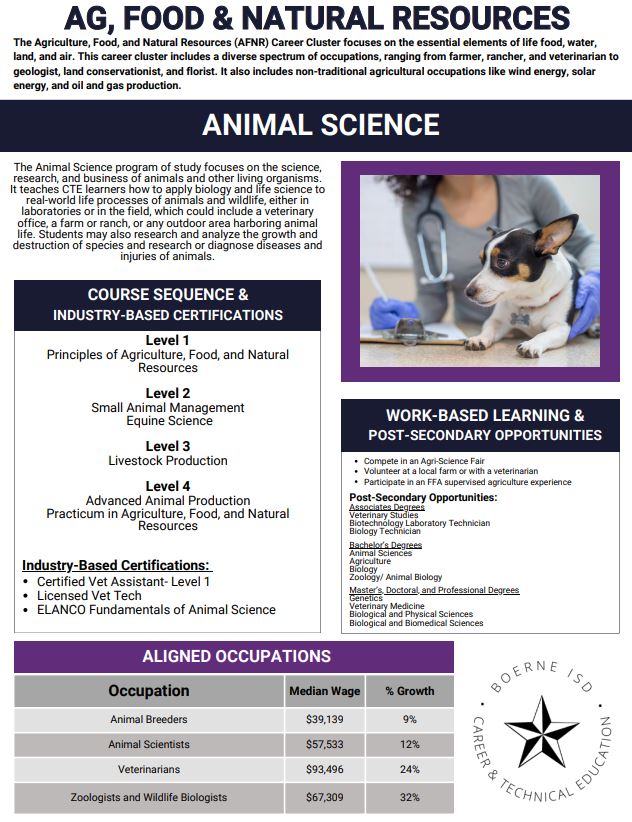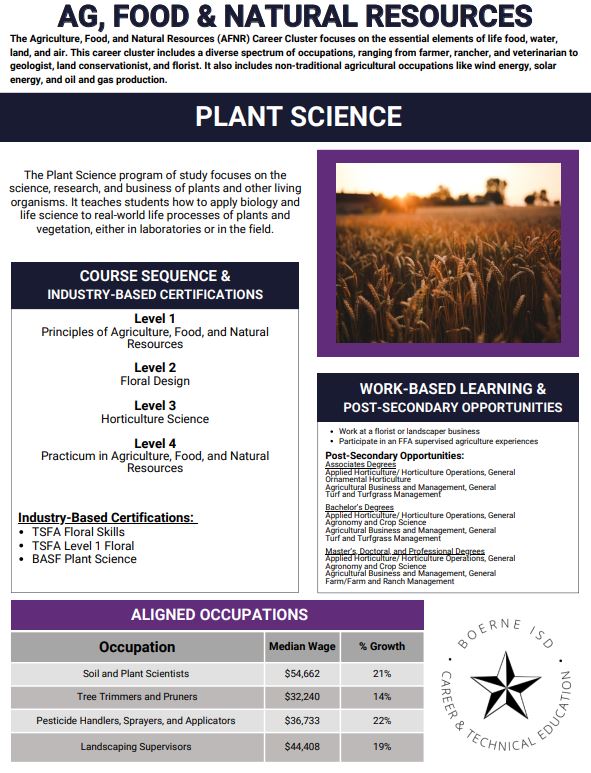Boerne High School Agriculture Courses
Boerne High School offers many classes that are in conjunction with FFA! Here is where you can learn a little bit about the classes, and the advisors that teach these courses!
Principles of Agriculture, Food, and Natural Resources
(Sawyer & Reid)
Principles of Agriculture, Food, and Natural Resources will allow students to develop knowledge and skills regarding careern and educational opportunities, personal development, globalization, industry standards, details, practices, and expectations. To prepare for careers in agriculture, food, and natural resources, students must attain academic skills and knowledge in agriculture. To prepare for success, students need opportunities to learn.
Small Animal Management
(Young & Reid)
Students will acquire knowledge and skills related to small animals and the small animal management industry. Small Animal Management may address topics related to small mammals such as dogs and coats, amphibians, reptiles, and birds.
Equine Science
(Young & Reid)
Students learn skills related to animal systems and develop knowledge related to career opportunities. Animal species studied in this course include: horses, donkeys, and mules.
Livestock Production
(Sawyer)
In Livestock Production, students will acquire knowledge and skills related to livestock and the livestock production industry. Livestock Production may address topics related to beef cattle, dairy cattle, swine, sheep, goats, and poultry. To prepare for careers in the field of animal science, students must attain academic skills and knowledge, acquire knowledge and skills related to animal systems and the workplace, and develop knowledge and skills regarding career opportunities, entry requirements, and industry expectations. To prepare for success, students need opportunities to learn, reinforce, apply, and transfer their knowledge and skills in a variety of settings.
Advanced Animal Science
(Sawyer)
This course examines the interrelatedness of human, scientific, and technological dimensions of livestock production. Instruction allows for the application of scientific and technological aspects of animal science through 40% field and laboratory experiences.
Agricultural Mechanics and Metal Technologies
(Warner & Young)
This course develops students’ understanding of agricultural mechanics as it relates to safety and skills in tool operation, electrical wiring, plumbing, carpentry, fencing, concrete, and metal working techniques. Students are expected to plan and perform cost-effective construction techniques including analyzing sites, plan for equipment and tools, and permit requirements.
Agriculture Structures, Design, and Fabrication
(Warner & Young)
Students will explore career opportunities, entry requirements, and industry expectations. To prepare for careers in mechanized agriculture and technical systems, students must attain knowledge and skills related to agricultural structures design and fabrication. To prepare for success, students need opportunities to learn, reinforce, apply, and transfer their academic knowledge and technical skills in a variety of settings.
Agriculture Equipment
(Warner & Young)
Students will acquire knowledge and skills related to the design and fabrication of agricultural equipment. To prepare for careers in mechanized agriculture and technical systems, students must attain knowledge and skills related to agricultural equipment design and fabrication. To prepare for success, students reinforce, apply, and transfer their academic knowledge and technical skills in a variety of settings.
Floral Design
(Seaman)
In this course, students apply principles and techniques of floral design as they develop an understanding of the management of floral enterprises. Analyzing artistic floral styles and historical periods, students learn traditions and contributions of diverse cultures. of the management of floral enterprises. They will analyze artistic floral styles and historical periods and learn traditions and contributions of diverse cultures. Students will classify and identify plants used in their arrangements and floral designs for special occasions.
Horticulture
(Reid)
Horticultural Science is designed to develop an understanding of common horticultural management practices as they relate to food and ornamental plant production. To prepare for careers in horticultural systems, students must attain academic skills and knowledge, acquire technical knowledge and skills related to horticulture and the workplace, and develop knowledge and skills regarding career opportunities, entry requirements, and industry expectations. To prepare for success, students need opportunities to learn, reinforce, apply, and transfer knowledge and skills in a variety of settings.
Wildlife
(Sawyer)
This course examines the management of game and non-game wildlife species, fish, and aqua crops and their ecological needs, as related to current agricultural practices. Certification options include the opportunity for Boater and Hunter Education licenses upon successful completion of the course and licensure examination.
Practicum in AFNR (Agriculture, Food, and Natural Resources)
(Warner & Young)
The practicum course is a capstone experience for students participating in a coherent sequence of career and technical education courses in the Agriculture, Food, and Natural Resources Career Cluster. Recommended prerequisite: a minimum of one credit from the courses in the Agriculture, Food, and Natural Resources Career Cluster. Students shall be awarded two credits for successful completion of this course.


